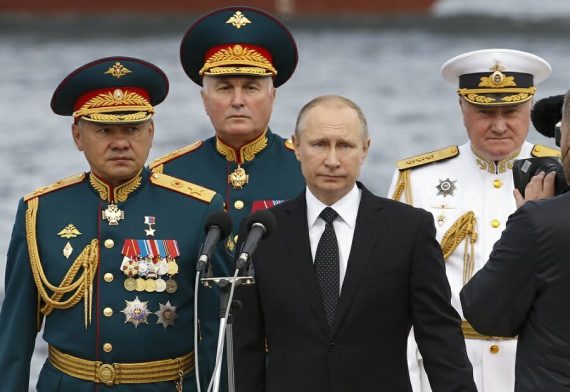After the Cold War and the demise of the Soviet Union, Russia was preoccupied with domestic reforms and works of reconstruction for almost ten years. Under the leadership of President Vladimir Putin since 2000, the country first entered a period of recovery followed by a steady growth. During this period, Russia gave priority to the issue of Chechnya, which was regarded as a significant security problem. Following its victory in the Second Chechen War, Russia was able to form an authority in the region, giving momentum to internal economic and political stability. More, the new regime began focusing upon developing its military force, ensuring it became capable in defeating external threats.
Hence, Russia’s military interventions in Georgia, Ukraine and Syria are reflections of this strategy. At this point, in order to understand Russia’s strategy and what it requests from the international arena, Putin’s historical speech delivered at the Munich Security Conference in 2007 and Russia’s state doctrine must be addressed.
Putin’s Munich Speech and Doctrines
The speech Putin delivered at the Security Conference in Munich in 2007 had drawn great reactions. In fact, the speech was called the Putin Doctrine. In his harsh criticism against the unipolar world system, Putin’s words that drew the most attention were the following:
“However, what is a unipolar world? One might embellish this term, at the end of the day it refers to one type of situation, namely one center of authority, one center of force, one center of decision-making. It is world in which there is one master, one sovereign. And at the end of the day this is pernicious not only for all those within this system, but also for the sovereign itself because it destroys itself from within.”
The points emphasized by Putin in Munich can also be regarded as the priorities of the Russian state doctrine. The Russian Federation shapes its domestic and foreign policy based on three main principles: first, the National security doctrine, which assesses internal and external threats and specifies functions of the governmental bodies in this domain. Second, the Foreign policy doctrine, which outlines general political purposes and priorities in the international arena and finally, the military doctrine, which defines external threats to the country and ways and means of national defense.
Following the disintegration of the Soviet Union, Russia adopted four national security doctrines (1997, 2000, 2009, 2016), four military security doctrines (1993, 2000, 2010, 2014) and four foreign policy doctrines (1993, 2000, 2008, 2013). When we examine these doctrines, two main emphases come up which never change: A unipolar world cannot be accepted, a multi-polar world order is required for international stability and NATO’s expansionist policy is a national security threat for Russia.
These two main points are the backbone of the doctrines. For a multi-polar world order Russia wants to form a new power center with countries like China, India and Iran under the umbrella of International Organizations like the Shanghai Cooperation Organization (SCO)Moreover, the Eurasian Economic Union and the Collective Security Treaty Organization formed by the former Soviet bloc countries are a part of Russia’s initiative towards establishing new blocks.
While attempting to form these kinds of new power centers, Russia is also trying to prevent NATO’s expansionist policy towards its borders. Hence, the 2008 Georgia and 2014 Ukraine military interventions are significant signs of Russia’s determination on this issue. On the other hand, with the military intervention in Syria in 2015, Russia moved its power struggle with the West far away from its borders.
Military Interventions and New Cooperation
Russia has defined NATO and the EU’s expansionist strategy towards Caucasian/Eastern European countries as a national security threat. Especially the “color revolutions” taking place in Georgia and Ukraine in the 2000’s have greatly disturbed Russia. NATO’s expansion strategy towards the Russian borders created the necessity for a counter move in terms of Russia’s interests. In fact, the Russia-Georgia war had been the first indication in this regard.
The Russia-Georgia War did not bring an end to the struggle for influence in the former Soviet geography among the US-EU-Russia triangle, on the contrary, it caused the struggle to deepen further. Six years after the war, as a result of Ukraine forming closer relations with the EU, Russia first occupied Crimea and then annexed it in contradiction to international law.
Recommended
The economic and political sanctions towards Russia applied by the Western countries following the occupation of Ukraine were not enough to deter Putin. With the military intervention in Syria in 2015, Russia took revenge of the Libya operation conducted during the Arab Spring, gaining the upper hand against the West. By getting involved in Syria, Russia has shifted the international attention away from Ukraine and saved itself from further pressure. Just like a player being trapped in a corner of the “go” board moving to another corner of the board in order to rescue itself from this trap, Russia which was trapped in Ukraine moved the “stone” to Syria.
http://thenewturkey.org/ex-soviet-state-fighters-in-daesh/
Russia has obtained significant power in international politics as a result of these three military interventions. Apart from the military interventions, it also established a security circle in the region by signing new military agreements with Central Asian countries, Armenia and Belarus. In addition to its involvement in Syria, Russia also seeks to enhance its military relations with Libya and Egypt by signing new military agreements.
Another country with which Russia deepened its relations during this period is Turkey. After the aircraft crisis, relations between the two countries returned to its former level. There are still numerous areas of conflict between the parties, particularly the Syria crisis. First of all, Russia’s cooperation with the terrorist organization PYD in Afrin disturbs Turkey. In addition, the Russian occupation of Crimea is a security threat for Turkey in the Black sea region. More, Russian sanctions are still in effect on certain Turkish products despite the agreement between the two governments. These are only the apparent problems that the two countries have to deal with at first. Nevertheless, the two countries continue working together in the Turkish Stream Project and the Akkuyu nuclear power plant project, which are strategically important. The talks held between the two countries on Turkey’s purchasing of S-400 air defense system from Russia is also quite significant. Russia by acting mutually with NATO-member Turkey in some certain strategic projects in energy and military areas is sending a message to the West.
The Obstacles to the Goals
The prospect of Russia being able to prevent NATO and the EU’s expansionist policies depends on several factors. At this point, Russia should first of all overcome domestic structural problems. Firstly, it needs to speed up economic modernization and address the issue of corruption in governmental organizations. In the report entitled Theses on Russian Foreign Policy, prepared by the Center for Strategic Research (CSR) and the Russian International Affairs Council (RIAC) in 2017, the following inference is highly important as quoted: “The underdevelopment of the Russian economy and its governance institutions poses a much more significant threat to the country’s sovereignty and territorial integrity than realistic military threats that Russia is already well protected from.”
Russia’s extreme economic dependence on energy revenues is another important problem. The share of petroleum and natural gas in Russia’s budget revenue is approximately 45 percent. Despite the high energy revenues gained between 2003 and 2013, the Russian industrial structure has not been revived yet. Furthermore, the economic and political sanctions of the West following the Crimea occupation have placed the Russian economy in a difficult situation. Alongside these domestic issues, Russia’s dependence on China is also an important factor in its quest to become one of the important power centers of the multi-polar world system.
Although Russia is an important military and political power, its economic deficiency prevents it from fulfilling its long term global policies. This is where China comes into play. Russia is the largest crude oil and natural gas supplier of China. In the past where Russia has experienced problems with its western counterparts on energy security, it automatically turned to China and secured new energy agreements. Russia also exploits SCO against the West in the international politics. Not only Russia but also China has influence on SCO countries. Indeed, China has greater influence on SCO than Russia. While China and Russia may be perceived as strong allies, their political interests do not always coincide and this can be displayed by the economic rivalry over Central Asia. Ultimately, Russia’s place within the global power structure. Although the two countries seem like strong political allies, political interests of China and Russia do not always coincide. The economic rivalry over Central Asia is a good example of this. One way or another, Russia’s place in international power politics will depend on the course of Sino-Russian relations.
http://thenewturkey.org/can-turkey-benefit-from-a-strategic-alliance-with-russia/
Turkey is another key country for Russia, whose success is related to aligning its political interests with Turkey’s interests in the Caucasus, Central Asia, the Black Sea and Middle East. A similar situation is also true for Turkey. If Russia wants to solve disputed problems with Crimea, Abkhazia and Nagorno-Karabakh, it has to consider Turkey’s interests as Turkey has historical, cultural, and political links with the region. Another topic is energy. Instead of Russia, Western consumers support Turkey as an alternative energy route from the Caspian to Europe, as Turkey has been considered a reliable partner for Caspian producers and their exports. All of these factors force Russia to take into consideration the geopolitical importance of Turkey. The two countries may coordinate their policies to ensure security and stability in the Black Sea and continue their efforts to stabilize Syria and the Middle East. The “aircraft crisis” has shown both sides that an enmity between Turkey and Russia would only lead to a lose-lose situation.
A unipolar world order is not an option for Russia, which considers Western powers at its borders a potential national security threat. The real challenge for Russia is tied to her ability in dealing with internal structural problems and its relationship with China and Turkey, which will be decisive in determining Russia’s position in world politics.





